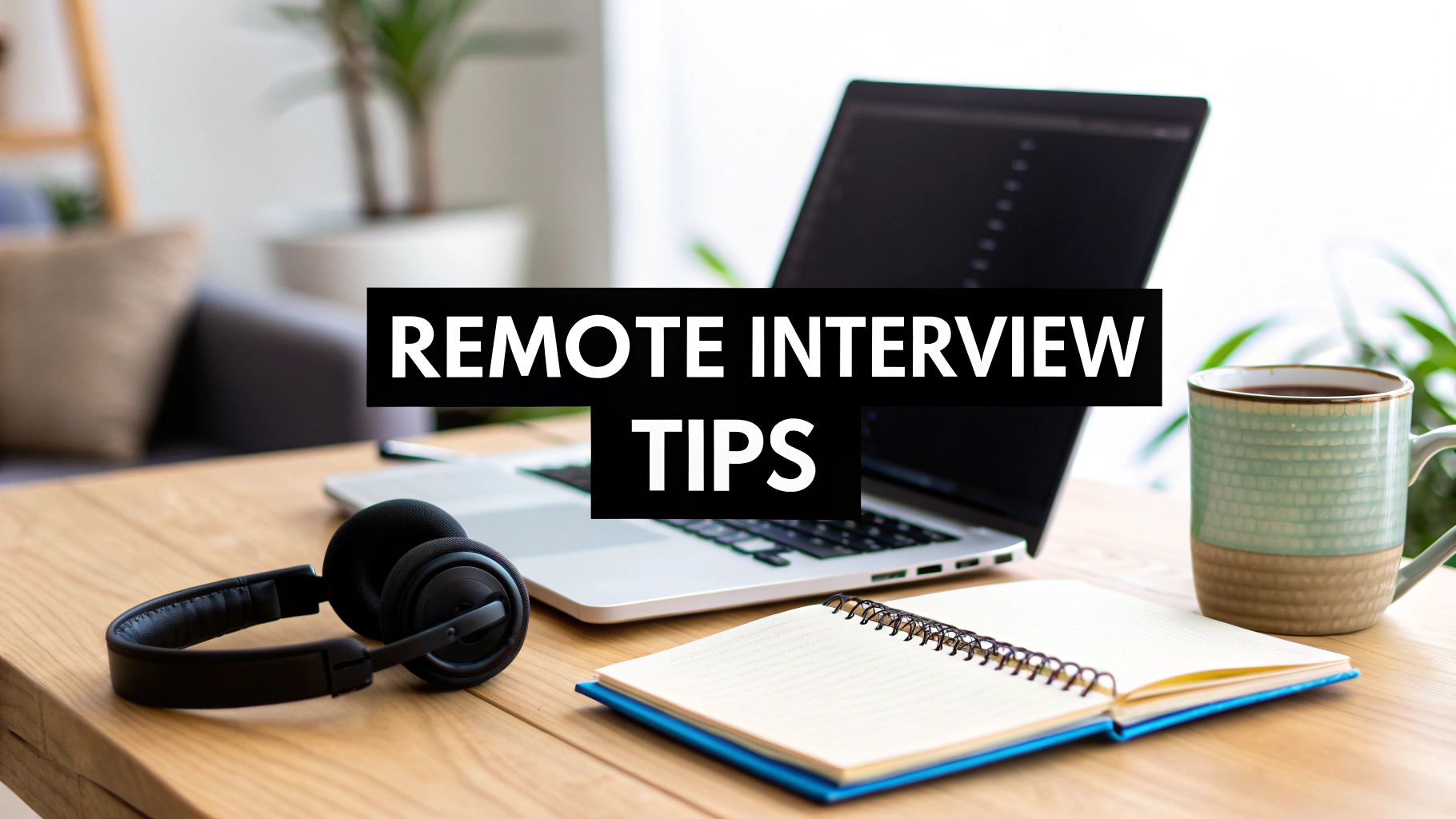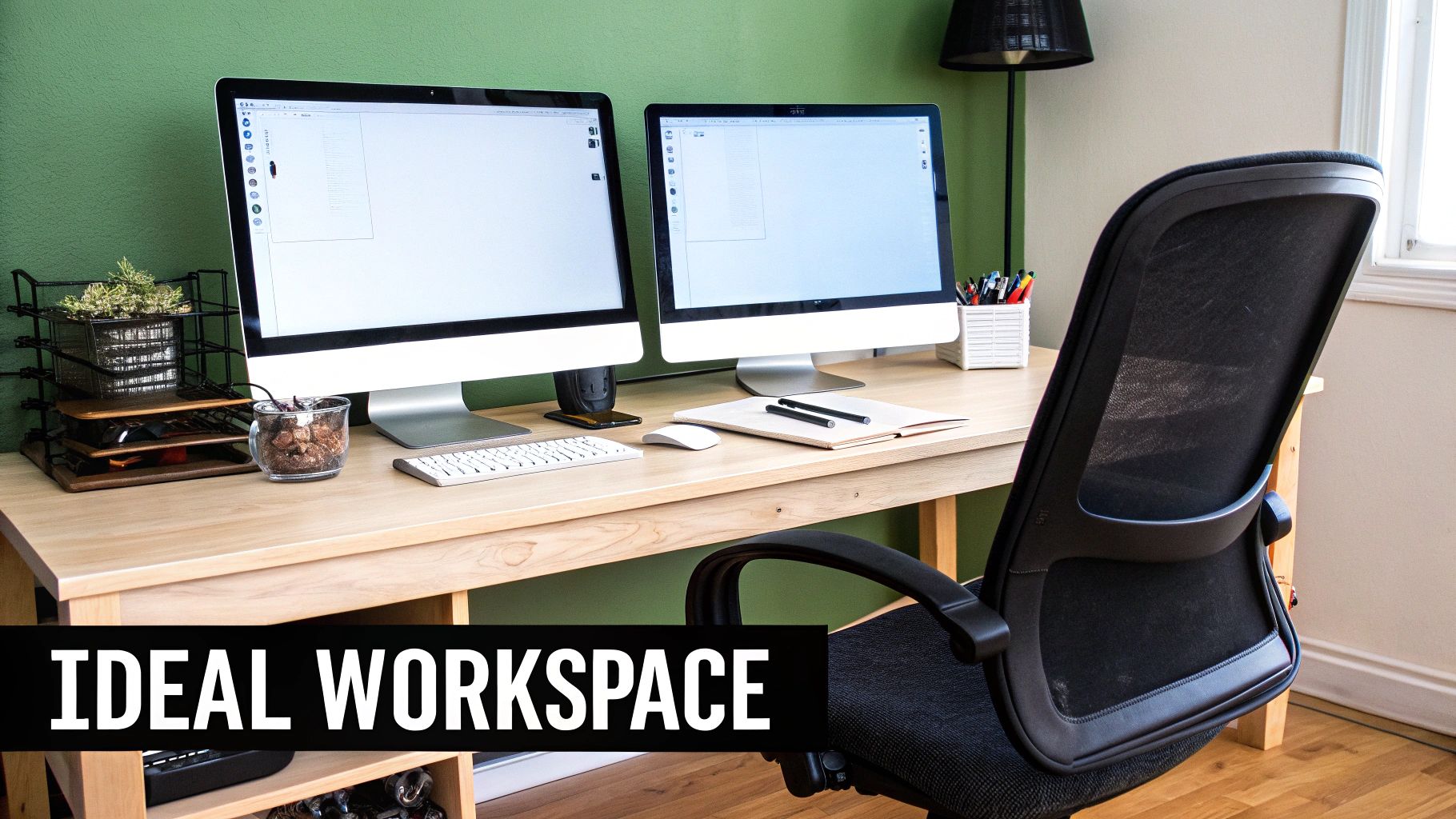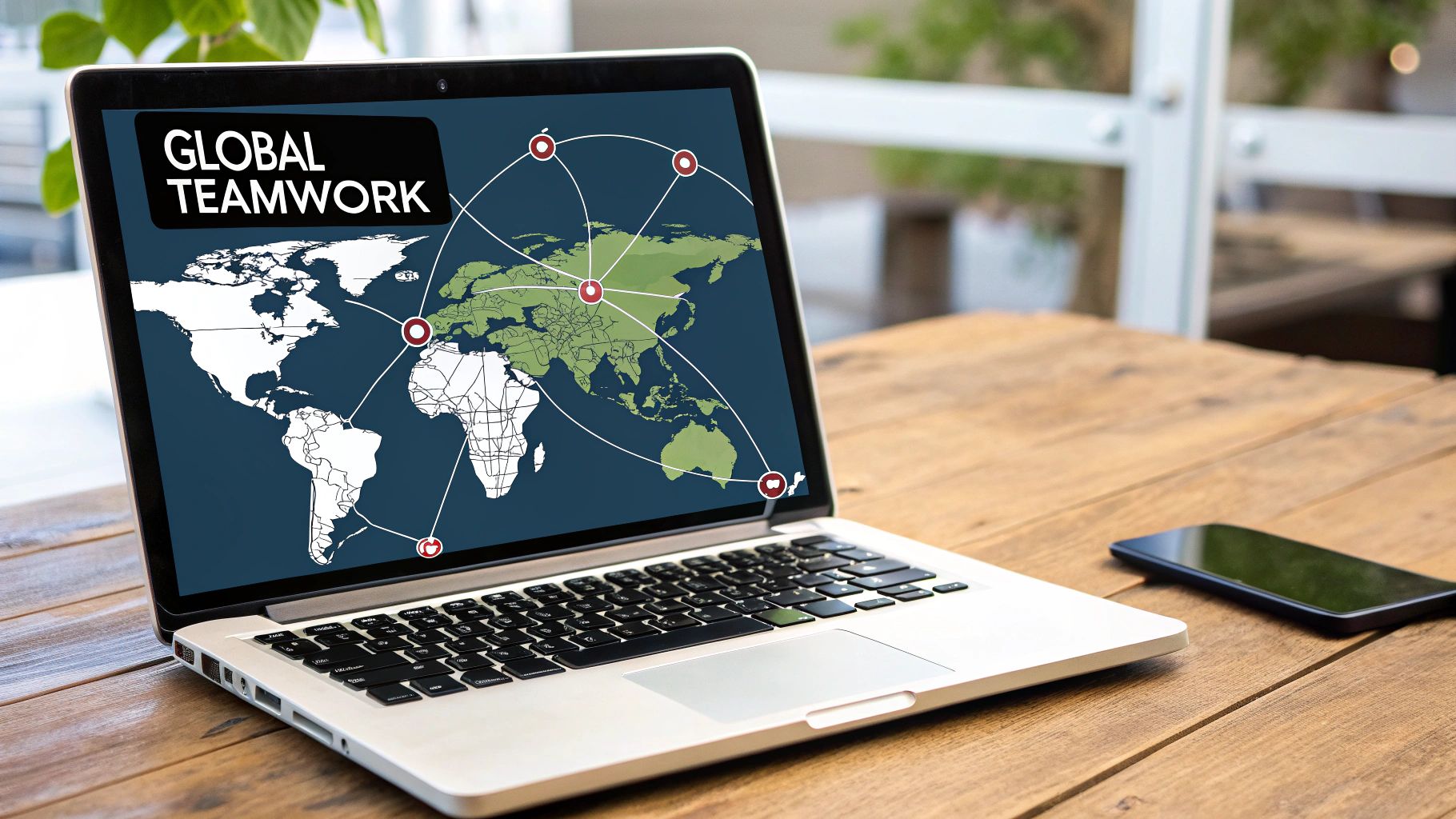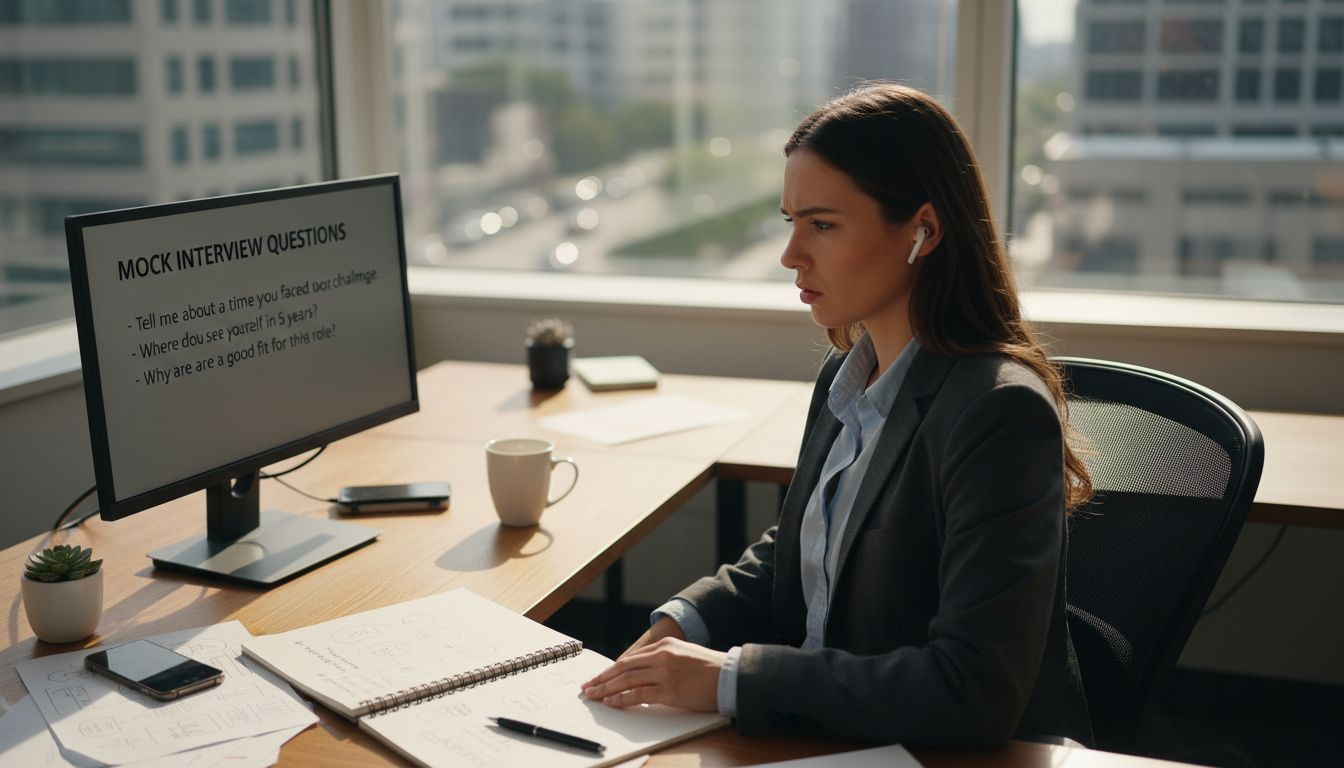8 Essential Remote Work Interview Questions for 2025

The landscape of work has fundamentally shifted, and with it, the interview process. Landing a remote role isn't just about showcasing your technical skills; it's about proving you can thrive in an autonomous, digitally-native environment. Hiring managers are no longer just asking, "Can you do the job?" but rather, "Can you do the job from anywhere?" This shift requires a new level of preparation, as the questions are designed to probe your self-discipline, communication habits, and problem-solving abilities without direct supervision.
This guide deconstructs the 8 most critical remote work interview questions you'll face. We move beyond generic advice, providing a deep strategic analysis for each question, actionable answer frameworks, and the subtle nuances that separate a good answer from a great one. Mastering these responses is your key to demonstrating the self-discipline, communication skills, and technical readiness that top remote companies demand.
To truly excel in these interviews, it's essential to be familiar with the core principles of effective remote work. Understanding established frameworks can provide a strong foundation for your answers. For a deeper dive into these principles, consider reviewing the 10 Remote Work Best Practices to Thrive which outlines key habits for success. This guide will help you articulate not just how you'll work, but why your approach is effective.
1. How do you stay motivated and productive when working from home?
Interviewers ask this foundational remote work interview question to gauge your self-discipline, time management skills, and ability to thrive without direct, in-person supervision. They want to see if you have a proactive, structured approach to your workday, proving you can handle the autonomy that comes with remote employment.

A strong answer moves beyond generic statements like "I'm a self-starter." Instead, it provides a clear, tactical framework demonstrating your personal accountability and organizational methods.
Strategic Breakdown of a Strong Answer
A compelling response showcases a multi-faceted strategy that combines environment, process, and communication. The goal is to paint a picture of a reliable and high-performing remote employee.
Example Answer:
"I maintain productivity by structuring my day like I would in an office. I have a dedicated workspace free from distractions, and I start each morning by outlining my top three priorities. I use a time-blocking technique, assigning specific chunks of my calendar to deep work and checking communications. For motivation, I schedule a brief virtual coffee chat with a colleague mid-week to stay connected and maintain a sense of team camaraderie. This system helps me create clear boundaries and consistently meet my deadlines."
Analysis and Key Insights
- Environment: The candidate mentions a "dedicated workspace." This shows they understand the importance of separating work from personal life, a key challenge in remote setups.
- Process: They specify using "time-blocking" and prioritizing tasks. This is a concrete methodology, not a vague promise of productivity. It proves they have an existing system.
- Communication: Mentioning a "virtual coffee chat" demonstrates an understanding of the need to combat isolation and proactively build team relationships, a crucial skill for remote workers.
Actionable Takeaways for Your Interview
To prepare for this common remote work interview question, build your answer around these three pillars:
- Describe Your Structure: Talk about your dedicated office setup, your daily routines (e.g., starting at 9 AM sharp), or how you create a "work mode" mindset.
- Name Your Tools & Techniques: Be specific. Mention productivity apps like Asana or Trello, time management methods like the Pomodoro Technique, or your personal system for tracking tasks.
- Explain Your Connection Strategy: Show how you stay engaged with your team. This could be through regular check-ins on Slack, participating actively in virtual meetings, or setting up informal chats to foster relationships.
2. Describe your home office setup and ideal work environment
When posing this remote work interview question, hiring managers are looking for proof that you’ve created a professional, functional, and distraction-free space to work effectively. It’s a practical assessment of your commitment to remote work, your technical preparedness, and your ability to maintain productivity and professionalism outside of a traditional office.

A strong response demonstrates foresight and planning. It goes beyond saying you have a desk and chair, detailing the elements that ensure reliability, focus, and a seamless connection to the team.
Strategic Breakdown of a Strong Answer
An effective answer addresses the key pillars of a successful remote setup: the physical space, the technology that powers it, and the strategies for maintaining a professional presence. It assures the interviewer you are ready to start contributing from day one.
Example Answer:
"I've set up a dedicated office in a spare room with a door I can close to minimize noise and interruptions. My setup is centered around an ergonomic chair and a sit-stand desk to ensure comfort during the workday. For technology, I have a high-speed fiber internet connection with a mobile hotspot as a backup, and I use a high-quality webcam and a noise-canceling headset to ensure clear communication in all our video calls. This environment allows me to focus completely and present myself professionally."
Analysis and Key Insights
- Environment: The candidate specifies a "dedicated office" with a door. This highlights their ability to create boundaries and control their work environment, directly addressing a common concern about remote work distractions.
- Ergonomics: Mentioning an "ergonomic chair" and "sit-stand desk" shows they prioritize well-being and long-term productivity, which is a sign of a mature and professional remote worker.
- Technology: They detail a "high-speed fiber connection" with a "mobile hotspot as a backup." This is a critical detail, demonstrating foresight and a plan for business continuity, which is highly valuable to any remote-first company.
Actionable Takeaways for Your Interview
When preparing to answer this question, think about your setup in terms of professionalism and reliability.
- Detail Your Physical Space: Describe how you’ve created a dedicated, distraction-free zone. Mention the door, the separation from living areas, or how you manage noise in a shared space.
- Highlight Key Technology: Be specific about your internet connection, webcam, and microphone or headset. Mentioning a backup plan for your internet is a powerful way to show you’re a reliable candidate.
- Emphasize Professionalism: Explain how your setup enables you to be a professional team member. This could be a clean background for video calls or a noise-canceling headset for clear audio.
3. How do you handle communication and collaboration with team members across different time zones?
Interviewers ask this critical remote work interview question to assess your ability to function within a distributed team. They need to know you can overcome the challenges of asynchronous work, maintain project momentum, and build strong relationships without the benefit of a shared workday. It’s a test of your organizational skills, empathy, and proactivity.

A top-tier answer goes beyond stating you're "flexible with hours." It details a clear, proactive strategy for managing asynchronous workflows, leveraging specific tools, and ensuring clarity and connection across different continents and schedules.
Strategic Breakdown of a Strong Answer
An effective response demonstrates a system that prioritizes documentation, clarity, and intentional overlap. The goal is to show you are a reliable hub of information, regardless of when your colleagues log on.
Example Answer:
"I thrive in asynchronous environments by prioritizing meticulous documentation and clear communication. In my last role, my team spanned from California to Germany. I made a habit of over-communicating progress in our project management tool, Notion, with daily updates that included my completed tasks, any blockers, and next steps. I also maintained a shared team calendar displaying everyone's local time zones to schedule our limited synchronous meetings respectfully. This documentation-first approach minimized real-time dependencies and ensured everyone, regardless of their time zone, was always up to speed."
Analysis and Key Insights
- Process: The candidate highlights a "documentation-first approach." This shows an advanced understanding of asynchronous work, focusing on creating a single source of truth to prevent delays.
- Tools: They mention specific tools like Notion and a "shared team calendar." This provides concrete evidence of their experience and shows they have a practical toolkit for managing distributed teams.
- Empathy: Referencing the respectful scheduling of meetings demonstrates awareness and consideration for teammates' work-life balance, a key trait for successful global collaboration.
Actionable Takeaways for Your Interview
To master this remote work interview question, frame your answer around these core competencies:
- Emphasize Documentation: Talk about your commitment to creating detailed records. Mention how you use tools like Confluence, Notion, or even detailed Slack threads to keep everyone informed without needing a live conversation.
- Name Your Collaboration Tools: Specify the software you use to bridge time gaps. This could include project management platforms (Jira, Asana), communication apps (Slack, Teams), and scheduling aids (Google Calendar with multiple time zones).
- Showcase Proactive Communication: Explain how you ensure clarity. This might mean ending your day with a summary of your work, clearly outlining blockers, or using screen recordings (like Loom) to explain complex topics asynchronously.
4. Tell me about a time when you had to solve a problem or complete a project with minimal supervision
This behavioral remote work interview question is a direct test of your autonomy and resourcefulness. Hiring managers want tangible proof that you can navigate challenges, make sound decisions, and drive projects forward without constant oversight. Your answer reveals your problem-solving process, initiative, and ability to perform effectively in an independent setting.
A weak answer is vague or describes a simple task. A powerful response uses a clear narrative, like the STAR (Situation, Task, Action, Result) method, to walk the interviewer through a complex situation that you successfully managed on your own.
Strategic Breakdown of a Strong Answer
An effective story demonstrates a blend of independent critical thinking and strategic communication. You need to show that you can operate alone but also understand when to loop others in, proving you are a reliable and trustworthy team member.
Example Answer:
"In my previous role, I was tasked with integrating a new payment API while my manager was on a two-week leave. The documentation was outdated, causing persistent authentication errors that blocked the project. I first dedicated a day to systematically testing endpoints and reviewing community forums for undocumented changes. When that didn't work, I proactively reached out to a contact in our partner company's developer support, explained the issue clearly, and collaborated with them to identify the deprecated security token. I documented the solution and updated our internal wiki before completing the integration ahead of schedule. When my manager returned, the project was complete, and the new documentation was ready for the team."
Analysis and Key Insights
- Problem-Solving: The candidate didn't just wait for help; they created a logical plan by "systematically testing endpoints" and researching independently. This shows initiative.
- Resourcefulness: Instead of giving up, they identified and utilized an external resource ("a contact in our partner company's developer support"). This proves they know how to find solutions.
- Proactive Communication & Documentation: They "documented the solution" and updated the wiki. This demonstrates foresight and a commitment to helping the team, key traits for a successful remote employee.
Actionable Takeaways for Your Interview
When preparing for this and similar remote work interview questions, structure your story using these three elements:
- Set the Scene (Situation & Task): Briefly describe a specific project or problem where you had significant autonomy. Clearly state your objective.
- Detail Your Independent Actions: Explain the specific, logical steps you took to diagnose and solve the issue. Emphasize your thought process and the resources you used without direct guidance.
- Quantify the Successful Result: Conclude with the positive outcome. Did you save time, solve a critical blocker, or improve a process? A measurable result makes your story more impactful.
5. How do you maintain work-life balance while working remotely?
Interviewers ask this critical remote work interview question to assess your ability to prevent burnout and sustain long-term productivity. They want to ensure you have practical strategies for creating boundaries, as the line between professional and personal life can easily blur when your office is at home.

A top-tier answer demonstrates self-awareness and intentionality. It provides concrete examples of how you transition in and out of "work mode," proving you can manage your energy and focus effectively without the physical separation of a traditional office.
Strategic Breakdown of a Strong Answer
A compelling response will highlight clear, actionable boundaries related to time, space, and technology. The goal is to show the interviewer that you are a responsible, sustainable remote employee who actively manages their well-being.
Example Answer:
"I maintain a strict work-life balance by implementing clear boundaries. I have a dedicated office space, and I start and end my day at consistent times. To signal the end of my workday, I have a 'shutdown ritual' where I review my tasks for the next day, close all work-related tabs, and then physically leave the room. I also make sure to block out personal time on my calendar, like my lunch break, and I turn off work notifications on my phone outside of my set hours. This helps me fully disconnect and recharge, ensuring I'm focused and productive during work hours."
Analysis and Key Insights
- Time Boundaries: The candidate mentions "consistent start and end times" and a "shutdown ritual." This shows a proactive approach to time management and a clear method for transitioning out of work.
- Physical Boundaries: They specify a "dedicated office space" and the act of physically leaving it. This demonstrates an understanding of the psychological importance of separating work and personal environments.
- Digital Boundaries: Mentioning that they "turn off work notifications" is a key tactical detail. It proves they are intentional about protecting their personal time from digital encroachment, a common remote work challenge.
Actionable Takeaways for Your Interview
When preparing for this remote work interview question, structure your answer around your specific boundary-setting techniques:
- Define Your Time: Explain your process for starting and ending the workday. Do you use an alarm? A specific shutdown routine? Do you block personal time on your calendar?
- Describe Your Space: Talk about how you create a physical or mental separation. This could be a separate room, a specific desk, or even just packing away your laptop at the end of the day.
- Detail Your Tech Rules: Be specific about how you manage digital communication. Do you use different browser profiles? Do you silence notifications from apps like Slack or email after hours?
6. What tools and technologies do you use to stay organized and manage your tasks remotely?
Interviewers ask this question to assess your tech-savviness and your ability to build an effective digital workflow. They want to know if you can leverage technology to manage projects, communicate clearly, and maintain high levels of organization without in-person oversight. This question separates candidates who use tools randomly from those who build intentional, productive systems.
A strong answer goes beyond listing a few popular apps. It explains the "why" behind your choices, connecting specific tools to specific outcomes like improved collaboration, clearer task management, or better time tracking.
Strategic Breakdown of a Strong Answer
A compelling response demonstrates a thoughtful, integrated approach to your digital toolkit. The goal is to show you are not just a user of tools, but a strategist who builds systems to enhance remote productivity and collaboration.
Example Answer:
"I rely on a core stack of tools to manage my workflow. For project management, I'm proficient in Asana, where I break down large projects into actionable tasks with clear deadlines and owners. This ensures everyone is aligned on priorities. For team communication, I use Slack for quick, asynchronous updates and Zoom for scheduled deep-dive meetings. I also structure all my project documentation in Notion, creating a centralized source of truth that reduces back-and-forth questions. This system keeps my work organized and transparent for the entire team."
Analysis and Key Insights
- System-Oriented: The candidate presents their tools as a "core stack," not just a random list. This shows they have a systematic approach to their work.
- Purpose-Driven: They connect each tool to a specific function: Asana for "project management," Slack for "asynchronous updates," and Notion as a "centralized source of truth." This demonstrates strategic thinking.
- Collaborative Focus: The answer emphasizes how these tools facilitate team alignment and transparency, crucial skills for a successful remote employee.
Actionable Takeaways for Your Interview
When preparing for this remote work interview question, frame your answer around your personal productivity system:
- Categorize Your Tools: Group your tools by function (e.g., project management, communication, documentation). Mention platforms like Trello, Microsoft Teams, or Google Workspace.
- Explain Your “Why”: For each tool, briefly explain how it helps you stay organized or collaborate effectively. Focus on the outcome, not just the feature.
- Show Adaptability: Mention that you are a quick learner and comfortable adapting to a company’s existing tech stack. This shows flexibility and a team-player attitude. To efficiently manage your tasks and boost your output, exploring the top remote work apps for productivity can streamline your remote workflow.
7. How do you handle distractions and interruptions while working from home?
Interviewers ask this remote work interview question to assess your self-awareness and problem-solving skills. They want to know if you can proactively manage your environment to maintain focus and deliver high-quality work, even when faced with the inevitable disruptions of a home setting.
A strong answer demonstrates that you have already considered this challenge and implemented practical, effective strategies. It shows you can set boundaries and take ownership of your productivity without needing external management to keep you on track.
Strategic Breakdown of a Strong Answer
A compelling response will balance environmental controls with clear communication and personal discipline. The goal is to show you can mitigate distractions while remaining an accessible and collaborative team member.
Example Answer:
"I take a multi-layered approach to managing distractions. First, I use noise-canceling headphones and have a 'focus mode' playlist, which signals to me it's time for deep work. Second, I've had clear conversations with my family about my core working hours, and my closed office door is our signal that I can't be interrupted. For digital distractions, I use a browser extension to block non-work-related sites during specific time blocks, which keeps me focused on the task at hand."
Analysis and Key Insights
- Environmental Control: The candidate mentions "noise-canceling headphones" and a "closed office door." These are concrete physical tools and signals used to create a productive atmosphere.
- Communication: They specify having had "clear conversations with my family." This demonstrates proactive communication and the ability to set respectful boundaries, a critical soft skill.
- Digital Discipline: Referencing a "browser extension" shows a sophisticated understanding of modern distractions and a tactical method for managing them. It’s a specific solution, not a vague promise.
Actionable Takeaways for Your Interview
To effectively answer this remote work interview question, build your response around these three pillars:
- Outline Your Physical Strategy: Talk about your dedicated workspace, tools like headphones, or any visual cues you use (e.g., a sign on the door) to minimize interruptions.
- Explain Your Communication Protocol: Describe how you set expectations with family, roommates, or others in your home. This shows you can handle interpersonal dynamics professionally.
- Detail Your Digital Boundaries: Mention any software, techniques (like turning off notifications), or habits you use to stay focused and avoid the pull of digital distractions like social media or personal email.
8. Describe a challenging situation you faced while working remotely and how you resolved it
This behavioral question is designed to test your real-world problem-solving skills in a remote context. Interviewers want to move beyond hypotheticals and understand how you navigate genuine remote work challenges like communication breakdowns, technical failures, or timezone conflicts. They are assessing your resilience, accountability, and communication under pressure.
A weak answer might blame technology or other team members. A strong response takes ownership of the situation, clearly outlines the steps taken to resolve it, and demonstrates what was learned from the experience, making it a crucial part of any list of remote work interview questions.
Strategic Breakdown of a Strong Answer
An effective answer uses the STAR (Situation, Task, Action, Result) method to structure the narrative. It focuses on proactive communication and a solutions-oriented mindset, proving you can handle adversity without needing direct, in-person intervention.
Example Answer:
"In a previous role, my team and I were launching a major feature, but our lead engineer, based in a different timezone, unexpectedly went offline due to a power outage hours before the deadline. My task was to ensure the launch still happened smoothly. I immediately initiated a video call with the remaining team members to assess our remaining tasks and identify knowledge gaps. I then documented our plan in a shared channel and took responsibility for the final code merge, a task I had shadowed before but never led. The launch was successful, and I established a new protocol for creating backup points of contact for all critical projects."
Analysis and Key Insights
- Ownership: The candidate didn't wait for instructions. They "immediately initiated a video call," showing leadership and a proactive approach to problem-solving.
- Process: They used clear, collaborative tools ("a shared channel") to ensure alignment and transparency, a vital skill for distributed teams.
- Learning: The response concludes by mentioning they "established a new protocol." This shows they not only solved the immediate problem but also improved the team's future resilience.
Actionable Takeaways for Your Interview
When preparing your answer, use the STAR method to structure your story:
- Set the Situation: Briefly describe the remote work context and the specific challenge you faced (e.g., a miscommunication over Slack, a key stakeholder being unresponsive).
- Define Your Task: Explain what your specific responsibility or goal was in that situation. What needed to be accomplished?
- Detail Your Actions: This is the core of your answer. Describe the specific, tangible steps you took to resolve the issue. Emphasize communication, collaboration tools, and independent decision-making.
- Share the Result & Learning: Conclude with the positive outcome and, most importantly, what you learned or how you applied that lesson to prevent future issues.
Remote Work Interview Questions: 8 Key Comparisons
| Question / Topic | 🔄 Implementation Complexity | ⚡ Resource Requirements | 📊 Expected Outcomes | 💡 Ideal Use Cases | ⭐ Key Advantages |
|---|---|---|---|---|---|
| How do you stay motivated and productive when working from home? | Medium - relies on self-reporting and follow-ups | Low - mostly interview time | Insight into self-discipline and time management | Assessing remote work readiness and adaptability | Identifies self-motivated candidates with routines |
| Describe your home office setup and ideal work environment | Medium - requires technical and ergonomic evaluation | Medium - may need visual review or equipment check | Understand candidate’s workspace professionalism | Evaluating physical preparation for remote work | Reveals commitment and technical readiness |
| How do you handle communication and collaboration across different time zones? | High - involves assessing tool knowledge and examples | Medium - interview plus tool familiarity checks | Measures global teamwork and async communication | Roles with distributed or international teams | Shows flexibility and strategic communication skills |
| Tell me about a time you solved a problem or completed project with minimal supervision | Medium - behavioral STAR method interview | Low - interview focused | Demonstrates independence and problem-solving | Positions needing autonomy and leadership potential | Provides concrete examples of self-direction |
| How do you maintain work-life balance while working remotely? | Low - self-reflective question | Low - interview time | Reveals boundary-setting and stress management | Preventing burnout in remote roles | Identifies candidates focused on sustainable work |
| What tools and technologies do you use to stay organized remotely? | Medium - requires technical discussion | Low to Medium - depending on tool demos | Shows technical proficiency and productivity systems | Tech-savvy remote roles | Indicates adaptability and systematic organization |
| How do you handle distractions and interruptions at home? | Low to Medium - practical strategies discussion | Low - interview based | Understands environmental challenges and coping | Roles needing high concentration and self-control | Reveals realistic and tested productivity strategies |
| Describe a challenging situation faced remotely and resolution | Medium - behavioral question with depth | Low - interview based | Assesses resilience, problem-solving, adaptability | High-pressure or complex remote roles | Provides evidence of real-world remote experience |
From Preparation to Offer: Your Remote Interview Advantage
Navigating the landscape of remote work interview questions is fundamentally about demonstrating a specific, high-value skillset. It's about proving you possess the core competencies essential for success in a distributed environment: autonomy, proactive communication, and disciplined self-management. The questions we’ve explored, from handling time-zone differences to maintaining work-life balance, are all designed to test these very traits.
Your goal is not simply to answer the question but to tell a compelling story about your professional reliability. Each response should be a miniature case study showcasing your ability to thrive without direct supervision, collaborate effectively across digital channels, and contribute meaningfully to a remote team's culture and productivity.
Synthesizing Your Strategy for Success
As you prepare, remember the common thread weaving through all effective answers: evidence. Generic statements about being "organized" or "a good communicator" are insufficient. Instead, you must ground your claims in tangible examples and specific methodologies.
- For motivation and productivity questions: Reference the specific systems you use, like time-blocking or the Pomodoro Technique.
- For collaboration and communication questions: Mention the exact tools you're proficient in (e.g., Slack, Asana, Jira) and describe your communication protocols, such as providing daily asynchronous updates.
- For problem-solving questions: Structure your answers using a framework like STAR (Situation, Task, Action, Result) to clearly articulate your independent problem-solving capabilities.
By focusing on these specifics, you move beyond simply claiming you are a great remote candidate; you actively demonstrate it. You build a foundation of trust with the interviewer, showing them a clear picture of how you will operate and add value from day one.
Beyond the Questions: Adopting a Remote-First Mindset
Mastering these specific remote work interview questions ultimately prepares you for the modern workplace. The skills you highlight - accountability, clear documentation, and intentional communication - are not just valuable for remote roles; they are the hallmarks of a highly effective professional in any setting. This preparation is an investment in your career agility.
The ultimate takeaway is that a successful remote interview hinges on your ability to ease the hiring manager's primary concern: "Can this person perform at a high level without the traditional structures of an office?" Every answer you provide should be a resounding "yes." Frame your experience to highlight your proactive nature, your technical fluency, and your unwavering commitment to delivering results, regardless of your physical location. Step into your next interview not just as a candidate for a job, but as a strategic partner ready to excel in the future of work.
Ready to transform your preparation into a powerful performance? Go beyond memorizing answers and get personalized, AI-driven feedback. ParakeetAI analyzes your resume and the job description to provide you with tailored talking points and real-time coaching, ensuring you confidently address any remote work interview questions thrown your way. Elevate your interview game and land your next remote role by visiting ParakeetAI today.




